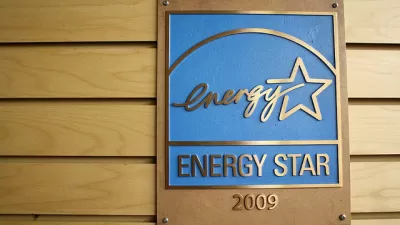A bi-partisan Senate bill to dramatically reduce carbon emissions by increasing energy efficiency got caught-up in Keystone XL pipeline politics, while President Barak Obama pursued his own energy efficiency agenda at a Walmart in Mtn. View, Calif.
The popular energy efficiency bill, sponsored by Sen. Jeanne Shaheen (D-N.H.) and Sen. Rob Portman (R-Ohio), stalled on May 7 after Republicans wanted to attach amendments, including approval of the controversial Keystone XL pipeline, states NPR host Melissa Block in the introduction to the story. Senate Majority Leader Harry Reid (D-Nev.) objected, stating that the Keystone vote ought to be separate. NPR's Jeff Brady reports that "the disagreement leaves the energy efficiency bill in limbo," she states. Listen here.
"It's been seven years since the last big energy bill passed through Congress and became law. This one is focused on reducing the amount of energy the country uses. Part of the legislation encourages states to adopt more efficient building codes," states Brady.
The American Council for an Energy Efficient Economy estimates the legislation would save the country $100 million over a decade and a half. For the environment, the organization says the bill would have the same effect as taking 22 million cars off the road.
No doubt this development comes with great disappointment to Shaheen and Portman, who "have been working for years to get an up-or-down vote on their bill, which contains measures to boost building codes, train workers in energy efficient building technologies, help manufacturers become more efficient and bolster conservation efforts at federal agencies, among other provisions," writes The Hill's Ramsey Cox.
Meanwhile, President Barak Obama was pushing his own energy efficiency agenda on Friday, May 9 at a Walmart in Mountain View, California. The event tied in with the release just days earlier of the administration's National Climate Assessment that calls attention to the dangers that climate change poses for all regions today, not just future generations, as many think.
"(T)he president laid out a list of clean-energy objectives he can accomplish without Congress's help and touted corporate pledges to expand the deployment of solar power. He lamented the lack of cooperation from lawmakers on clean-energy issues but said he would make sure the federal government does its part," writes Colleen McCain Nelson
Wal-Mart, the nation's largest retailer, pledged Friday to double the number of solar-power generation projects at its stores and facilities by 2020.
Labor unions were not thrilled with the venue that the president chose to promote his energy efficiency agenda, explains Lisa Fernandez of NBC Bay Area.
As with many other initiatives, it appears that the lead on energy efficiency will come from the private sector, the president's executive actions, and state and local laws while partisan politics hinders progress in the second branch of U.S. government. Is it any wonder that Congress began the year with a job approval rating of 13%?
FULL STORY: Keystone Pipeline Dispute Muddles The Path Forward On Energy Bill

Maui's Vacation Rental Debate Turns Ugly
Verbal attacks, misinformation campaigns and fistfights plague a high-stakes debate to convert thousands of vacation rentals into long-term housing.

Planetizen Federal Action Tracker
A weekly monitor of how Trump’s orders and actions are impacting planners and planning in America.

In Urban Planning, AI Prompting Could be the New Design Thinking
Creativity has long been key to great urban design. What if we see AI as our new creative partner?

How Trump's HUD Budget Proposal Would Harm Homelessness Response
Experts say the change to the HUD budget would make it more difficult to identify people who are homeless and connect them with services, and to prevent homelessness.

The Vast Potential of the Right-of-Way
One writer argues that the space between two building faces is the most important element of the built environment.

Florida Seniors Face Rising Homelessness Risk
High housing costs are pushing more seniors, many of them on a fixed income, into homelessness.
Urban Design for Planners 1: Software Tools
This six-course series explores essential urban design concepts using open source software and equips planners with the tools they need to participate fully in the urban design process.
Planning for Universal Design
Learn the tools for implementing Universal Design in planning regulations.
Gallatin County Department of Planning & Community Development
Heyer Gruel & Associates PA
JM Goldson LLC
City of Camden Redevelopment Agency
City of Astoria
Transportation Research & Education Center (TREC) at Portland State University
Jefferson Parish Government
Camden Redevelopment Agency
City of Claremont



























